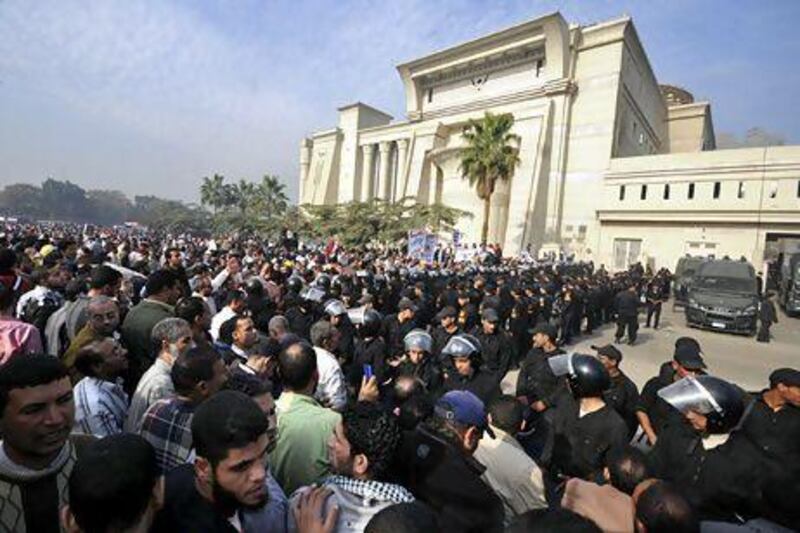CAIRO // As supporters of president Mohammed Morsi rallied outside Egypt's supreme constitutional court yesterday, the judges announced that they were going on strike until further notice.
They said that the demonstrators were spreading lies and trying to taint the image of the court.
It is the latest move in a power struggle between a president, backed by mostly Islamist political supporters and a judiciary that said it has been hamstrung by his series of authoritarian moves.
The judiciary's view is echoed by large sections of Egypt's population alarmed by his recent rulings, which included a temporary decree granting his decisions judicial immunity.
The court had been expected to rule yesterday on the legality of a constitutional assembly, which issued a hastily-completed draft of a new constitution.
It is to be put to a referendum on December 15.
The assembly was dominated by Islamists after representatives of secular political movements and the Christian minority withdrew.
Demonstrators, who gathered in Tahrir Square over the past week, have called the body invalid and criticised the draft constitution.
An interior ministry statement said that the authorities were committed to protecting the court and that all lawyers were able to enter the building and proceed with their work.
But as people chanting their support for Mr Morsi surrounded the building, the judges declared in a statement that "it is the Egyptian judiciary's blackest day on record" and that they could not enter the building because they feared for their safety.
The country has found itself deeply divided over the constitution, regarding both the dubious legal standing of the assembly that wrote it and the content of the document, which is a reworked version of one written in 1971.
Heba Morayef, of Human Rights Watch, said that a proposed change that would have prevented military trials of civilians was abandoned last month after the army intervened by sending a memo to the assembly.
The document, which looks likely to be approved in the referendum, if it can be organised in time, includes a clause that allows trying civilians in "very vague" terms in cases that harm the military, said Ms Morayef.
"The military has a very wide interpretation of what that means," she added, saying that because of the extensive economic reach of the forces, a person working in a military-owned pasta factory or travel agent could technically be tried in a military court.
One such trial began yesterday involving 25 civilians charged with resisting eviction from the island of Qursaya on the Nile in Cairo, land the military says it owns.
Ms Morayef said that it was, "inherently impossible" for people to have a fair trial in a military court.
"These are not independent judges," she said.
"They are serving military officers who report to the minister of defence, who reports to the president."





